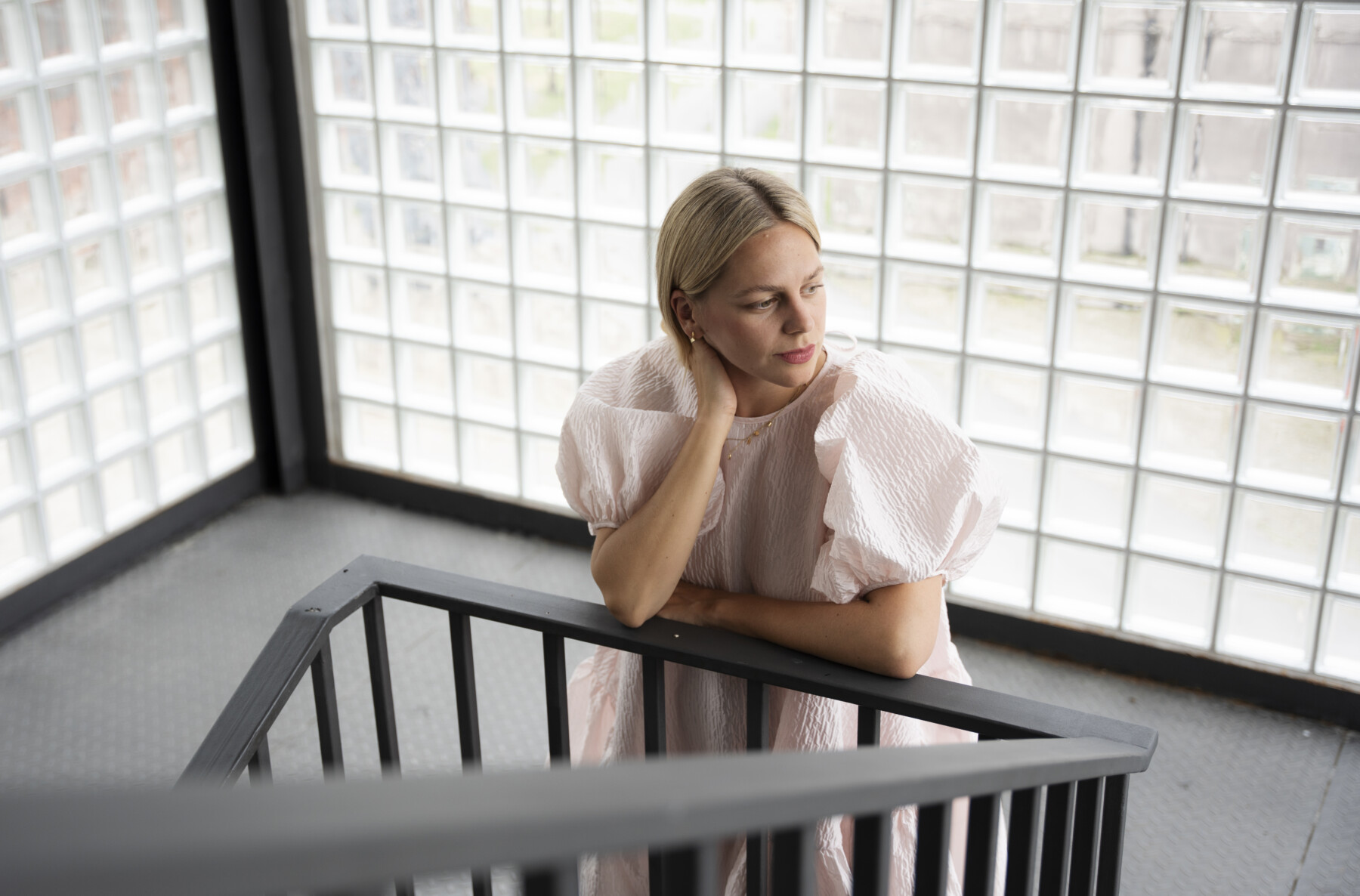INTERVIEW WITH Gabriela Knyblova

„The Ostrava Kamera Oko Festival is a truly unique. For me, it was the reason why I came back to Ostrava.“
Ostrava native, graduate of Theory and History of Dramatic Arts at Palacký University in Olomouc. She has been working at Ostrava Kamera Oko since 2015 and has been the festival’s director since 2017. She has been gaining her experience for more than ten years working at selected film festivals in the Czech Republic. Since 2013, she has coordinated international rights and film copies at the Summer Film School in Uherské Hradiště, and the Czech programme at the Jihlava IDFF. She has also worked at Academia Film Olomouc and the Animation Film Showcase in Olomouc, at UKUH and at the IFF Trenčianske Teplice. In addition to film, she is also a professional photographer and interior designer.
Since 2009, Ostrava has had its own cinematographers festival, the only one of its kind in the Czech Republic. This year, Ostrava Kamera Oko returns to the city centre, bringing with its progressive audiovisual art and international guests
Ostrava Kamera Oko profiles itself as a festival for cinematographers. Could you please tell us why? What’s your view on the camera in today's world, where audiovisual content surrounds us almost constantly?
The image of Ostrava Kamera Oko Festival has changed over its fourteen years. Jakub Felcman and Anna Kopecká founded it in 2009 with the idea to create an original film festival in Ostrava with a focus on the camera as a key component of filmmaking. There was no such festival in the Czech Republic at that time and to this day OKO is the only cinematography festival in the Czech Republic. However, only a few things have clear boundaries these days, and so over time we began to see OKO and the camera as such in a broader context. For us, it's not "just" part of traditional cinema as we all know it from the movie theaters. We focus on audiovisual content in all its forms. The camera and visual expression are used not only by filmmakers, but by artists in general. Not to mention journalists, scientists, and basically all of us in everyday life — we’re all filming. Moreover, with the rapid development of technology, new forms of art and ways of working with the image are emerging. We try to reflect all this at OKO.
The festival is therefore intended for a relatively wide audience with it crossing between so many areas…
Our festival is still primarily for those who are interested in the contemporary film scene. We bring new films that have appeared on film markets in the past year, we present the latest news from world festivals, for example from Cannes or Locarno, we prepare a programme for the professional public and students of cinematography and film in general. But that´s not all. Other interdisciplinary topics complement all that – we reflect on the contemporary visual arts and audiovisual scene, and we most certainly don’t neglect current social and political events.
You chose last year's festival theme in this spirit, referring to the challenging period of the pandemic. Does this year's edition have an overarching theme or motif?
This year we chose one of the French slogans of the revolutionary year 1968: Beneath the pavement, the beach. When the war broke out and Ukrainian flags, their colors reminiscent of the beach and the sea, flooded the cities, this slogan came to our minds. In it we hear not only an appeal, which is undoubtedly linked to its original meaning, but also hope and faith in a good ending. And we are curious to see how our audience and curators will feel about it. In addition, we have included Radim Špaček's 2013 documentary of the same name addressing the importance of Czech Television, which is also a very actual and political topic.
You mentioned curators, could you please tell us what is their role? Are they replacing the role of festival dramaturge?
No, I can´t say that. The curators are selected for each year independently and their film selections are part of a programme section, which we call the Curatorial Selection. We reach out to personalities across disciplines to give viewers just that diversity with which the camera can be viewed. For instance, this year we chose to cooperate with Tomáš Slunský, who works right here in Ostrava in the Gin&Platonic collective. The festival will also present autobiographical films by the Russian director Vadim Kostrov, who, by the way, will come to Ostrava in person. The next curator will be Martin Horyna, dramaturge of the Karlovy Vary festival, who will present films by Italian visual artist Yuri Ancarni. Cinematographer Yvon Teyssler will focus on poetic cinematography and films that have inspired her. Edith Jeřábková and Jakub Adamec will use an acoustic model of the new Ostrava concert hall to create an intervention in the Plato gallery space. And music dramaturge and journalist Pavel Klusák will draw up a three-hour audiovisual event, which will include a community breakfast.
Interview with Zelensky as an audiovisual achievement of the year
Ostrava Kamera Oko awards festival prizes. In what categories do the cinematographers compete?
We have two competition sections. The main one is called Official Selection and the audience will be acquainted with the most important things that happened in film industry in the past year. We usually present news from world festivals in Czech premieres. However, in recent years, when the situation has been significantly affected by covid, we have had to transform our programming strategy, so we are trying to look for non-traditional formats. This year, for example, the main competition will feature an interview with Volodymyr Zelensky, which was filmed in a bomb shelter at the beginning of the war. It was hosted by selected public television stations, including ČT, and we consider it the main audiovisual achievement of the year. The second section of the competition is dedicated to emerging Czech cinematographers and presents their short works. We are really pleased about this ongoing cooperation with these creators and our ability to follow these young talents even after their careers develop into longer formats. A good example being Yvon Teysslerová, who won the Short Film Competition at OKO in 2012 and returns this year with her own curatorial block.
But as we mentioned, your scope is much broader. What would you highlight from this year's programme?
This time we are placing a lot of emphasis on the Industry Programme, i.e., on the part of the programme that is normally, at most festivals, only accessible to professionals. We open this section to all viewers who are interested in the background and context of the films shown. For example, Vadim Kostrov, whom I mentioned earlier, received a special mention at last year's Jihlava IDFF for capturing the risks of living and making films in contemporary Russia. Our guests can look forward to his masterclass at OKO. This year´s OKO will be the first festival in the world to screen his entire trilogy, which is otherwise always presented in individual parts. I, myself, am very excited about him coming here in person. We are now striving for a second crucial meeting together with dramaturge Zuzana Černá. It should be the creative duo of Véréna Paravel and Lucien Castaing-Taylor. Their film De Humani Corporis Fabrica offers a different perspective on humanity from their position of anthropologists. Through a newly developed camera that senses sound outside and inside the body at the same time, they show images that we are normally too shy to see. This often provokes physical reactions in the audience, and it is this kind of progressive approach that interests us. We'll also discuss, for example, women cinematographers and their mental health in the context of what they do. The debate will be joined by journalist Linda Bartošová, who has focused on work-life balance in her book of interviews entitled "Women Journalists".
Back to the city centre
OKO is not limited to typical movie theaters. You organize your screenings and other programs in unusual places in Ostrava and its surroundings, for example the St. Wenceslas Church in Opava or the Barbora Mine near Karviná. What are you planning this year?
We regularly include a Special Screenings Section with films that we pay special attention to. And these are often site-specific projections in unusual places. Such screenings are then complemented by an accompanying thematic programme. This year, for example, we will be hosting a Spanish Party in the garden of the popular local restaurant Hogo Fogo. The summer film, featuring images by young Spanish cinematographer Gris Jordana, will be complimented with Spanish wine tasting and tapas. The awards ceremony and closing ceremony will also take place during the evening. And I would like to mention the audiovisual evenings, where space also plays a crucial role. We organize these AV Nights in cooperation with dramaturge and publicist Ondřej Lasák. This year it will take place again at PLATO Bauhaus and the final part of the programme will be taken care of by the Ostrava music platform AVB.
The festival is indelibly linked with the Lower Vítkovice area and the Hlubina Mine. It was screened there long before the reconstruction of the complex and later the Cineport cinema, now Etáž, became the festival base. What is the plan for this year? Where will the festival take place?
We decided to return the festival to the city centre, where it once started. This year, the accreditation centre and audience facilities will not be in Dolní Vítkovice, but in the city centre, in the Plato Gallery in the former Bauhaus. Debates and other accompanying programme will be held in the adjacent Jatky. However, the Etáž cinema will of course remain part of OKO as one of the screening venues. In addition, we will also be screening at Minikino again after a few years' break.
Organizing an event of this type in Ostrava certainly has some specifics, perhaps even pitfalls, compared to Prague. But it makes sense to you. What does OKO mean for Ostrava and vice versa?
Since it is a specific festival in its focus, the audience we have in Ostrava is not that wide compared to other events that take place here. Nevertheless, even among local people the festival found its regular audience. In the national and international context, OKO is an important cultural event that attracts people from abroad and helps the city as such to build its position as a strong cultural metropolis. In recent years, OKO has honored such luminaries of world cinema as Arnaud Desplechin, Albert Serra, and Bruno Dumont. Moreover, there are very few cinematographers festivals in Europe. The closest one, Camerimage, is held in Toruń, Poland. Ostrava has a strategic location, thanks to which we can reach audiences in Poland and Slovakia. Moreover, its industrial history is still very attractive for visitors. For me personally, OKO is a matter of the heart, which is why I came back to Ostrava. I found it impossible to organize a festival from anywhere else.
Text: Klára Froulík Šebestová
The author has written about culture and society in Ostrava and has published interviews and reports in Deník Alarm.
